Leased Property Eviction: Court Stresses Following Renewal Procedures.
02 July 2024
Dispute with Tenant/Landlord >> Property & Real Estate | Lease >> Property & Real Estate
In a recent court case, Hindustan Petroleum Corporation Limited (HPCL) was unsuccessful in challenging its eviction from a leased property. The landlords, represented by the respondent in the case, had filed an eviction suit after the lease term expired in April 2001.
The original lease agreement, established in 1961, granted M/s.Caltax (India) Limited (predecessor to HPCL) a 20-year lease with a renewal clause allowing for two additional 10-year terms. HPCL argued they exercised the renewal option but failed to produce a formal renewal lease document.

HPCL's defense rested on two main arguments. Firstly, they claimed the exercised renewal clause transformed the lease into a permanent one, exempting them from eviction. Secondly, they contested the validity of the termination notice issued by the landlords.
The Court, however, dismissed both arguments. The lack of a formal renewal lease document proved critical. The Court emphasized that HPCL, as a state-owned entity, has a duty to act fairly and reasonably. Following this principle, the Court stressed the importance of adhering to the stipulated procedures outlined in the renewal clause for it to be considered valid.
Consequently, the Court upheld the eviction decree passed by the lower courts. Additionally, the Court awarded mesne profits (compensation for holding over after lease expiration) to the landlords at the rate determined earlier.
